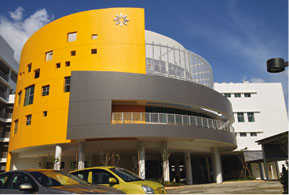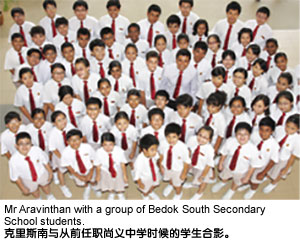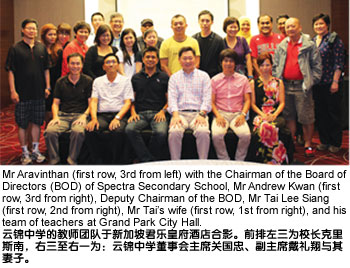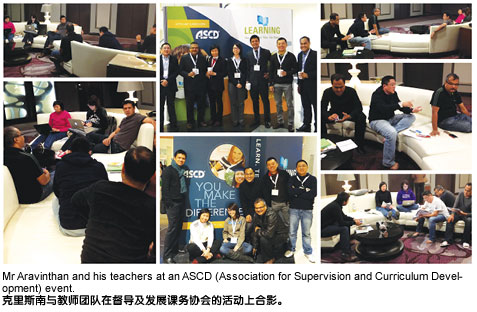 Speaking at the Ministry of Education’s annual Work Plan Seminar on 25 September 2013, Education Minister Heng Swee Keat emphasised the need for a change in Singapore’s education system and to eschew a one-size-fits-all educational approach so that students can achieve success in different ways.
Speaking at the Ministry of Education’s annual Work Plan Seminar on 25 September 2013, Education Minister Heng Swee Keat emphasised the need for a change in Singapore’s education system and to eschew a one-size-fits-all educational approach so that students can achieve success in different ways.
“We must remain broad and inclusive in our approach to providing opportunities for every child, and therefore provide multiple pathways in an open and inclusive system which develops different talents in each child to the fullest. There must be pathways for all to move up,” he reiterated.
Therefore, specialised schools have been set up in the last six years to provide students with different learning abilities with an alternative route to success. These schools are also becoming more widely accepted.
The first specialised school for Normal (Technical) students, Crest Secondary School, started in 2013 and a second, Spectra Secondary School, will open in January 2014.
Unlike students who are enrolled in the N(T) stream in mainstream schools who will graduate with a GCE N(T)-level qualification, students in these specialised schools will graduate with an additional qualification from the ITE (Institute of Technical Education), called the ITE Skills Certificate (ISC) qualification. It is this curriculum — one that allows students to take ISC modules as they build a strong foundation in literacy and numeracy — that has contributed to the value proposition of these specialised schools.
EduNation talked to Mr Krishnan Aravinthan, principal of Spectra Secondary School, to find out more about the new school, his team of teachers and the future of specialised schools in general.
Strengthening Student Engagement
 With 20 years of experience in teaching, of which seven have been spent teaching N(T) students, Mr Aravinthan firmly believes that N(T) students want to learn as much as students from other academic streams who are presumed to be more studious. “I think students are largely the same across the board,” he said. “They are all naturally curious. N(T) students are interested in learning but are we teaching them things that interest them?” With 20 years of experience in teaching, of which seven have been spent teaching N(T) students, Mr Aravinthan firmly believes that N(T) students want to learn as much as students from other academic streams who are presumed to be more studious. “I think students are largely the same across the board,” he said. “They are all naturally curious. N(T) students are interested in learning but are we teaching them things that interest them?”
Although Spectra Secondary School will adopt a MOE-designed curriculum like the other specialised schools, it will have the autonomy to customise it according to the needs and interests of its students. In order to engage its students, the School’s curriculum will be centred on three broad areas: creating a collaborative environment, making learning relevant and meaningful, and building confidence and self-belief.
Creating a Collaborative Environment
Students in Spectra Secondary School will be given opportunities to take ownership of their learning so that they will take a greater interest and ultimately be able to realise their full potential. To that end, they will be allowed to take ITE taster modules in lower secondary before specialising at upper secondary level in an ISC of their choice in one of four areas — Facility Services, Mechanical Servicing, Retail Services and Hospitality Services.
“Students must be given the opportunity to participate in their learning process. Teaching strategies should allow for students to learn in a collaborative environment. Students learn well in such an environment because their motivation and engagement levels go up when they are working and learning together with their peers,” said Mr Aravinthan.
One way in which the School will encourage active learning is by adopting a flipped classroom strategy together with a team-based learning approach. Referring to the teaching of Mathematics by way of example, he said, “Students can access content via online lessons and teachers will facilitate the learning in class through discussions and peer learning. Once you are able to engage them in such a manner, it should be easier to get them interested in a core subject like Mathematics.”
Making Learning Relevant and Meaningful
Another way to engage students and get them interested in learning is to make the subject come alive for them so that they can see its importance and its usefulness.
“Students must see the link between what they are studying in the classroom and what they can do with it outside of the classroom. It must be relevant and meaningful. What they are being taught must be authentic in nature so they can see the relevance, and naturally they will then be motivated to learn,” said Mr Aravinthan.
He explained that the ISC modules are a platform for the students to see how other subjects like English, Mathematics and Science are important. “For instance, if they specialise in Retail Services, they will have to learn how to communicate with customers and to provide excellent customer service. That’s where language comes in. It becomes an opportunity for them to learn the language in an authentic setting. They will then find more meaning in learning the language as the use of it becomes functional to them.”
Building Confidence and Self-belief
 Spectra Secondary School will also provide an environment that will allow the students to be competent in a particular area, in the hope that they will grow to be more confident in themselves. This is important as these N(T) students might not have enjoyed much success in their learning previously. Spectra Secondary School will also provide an environment that will allow the students to be competent in a particular area, in the hope that they will grow to be more confident in themselves. This is important as these N(T) students might not have enjoyed much success in their learning previously.
“These students must believe that they can make something out of their lives,” said Mr Aravinthan. “Confidence is important for any individual, and even more so for these students. Every little success will motivate them to learn more. It’s difficult for the students to keep trying when they don’t see any improvements. It is demoralising for them. Why would they be interested in something that they are doing badly in? How then should we customise our lessons so that our students feel competent? That is critical.
“It’s not so much about scoring a certain number of marks. That’s not how we measure their competence. For instance, if they are able to solve a Mathematical sum that they were previously unable to do, that is an improvement. That signals their ability to competently solve a problem. When they find themselves improving, they will want to put in more effort. When their competency level goes up, their confidence level goes up and their motivation to learn will go up as well.”
Building confidence and self-belief is a vital aspect of the School’s curriculum.
“It’s not just about academic success,” Mr Aravinthan stressed. “We want to instil this sense of confidence and self-belief in them that will see them through life so we have to go beyond teaching them literacy and numeracy. After graduation, some of them will enter the working world and it is paramount that they are confident. They must know how to carry themselves well. They must not shy away from meeting new people. They must know how to work with others. In short, they must be confident of their abilities. If we are able to do that, it is the best gift that we can give them. It’s priceless because when they are confident, they will be better equipped to navigate the challenges in life.”
Supportive Teachers
Since nurturing confidence and a sense of self-belief will be a top priority in Spectra Secondary School it is crucial that its teachers fully believe in the potential of their students. As a result, Mr Aravinthan has carefully selected a team of teachers that shares his beliefs and passion for helping these students.
 Of about 200 teachers who applied to teach in Spectra Secondary School in April 2013, only 19 were chosen. Of about 200 teachers who applied to teach in Spectra Secondary School in April 2013, only 19 were chosen.
“For the students to feel a renewed sense of confidence, we must look at the care and support that we give them. Having good programmes alone are not enough to boost a student’s confidence. We need committed teachers who believe in the good of their students and who will be there to support and encourage them.
“There must be a positive teacher-student relationship. Some of these students might not have strong support at home so teachers will need to step in and provide them with additional support. With a class size of 20 students, there will be a higher interaction level between the teachers and students. I want my students to feel like they are part of a larger family here in Spectra Secondary School so there must be this sense of closeness between teachers and students,” explained Mr Aravinthan.
The School will therefore only take in 200 students when registration opens at the end of the year. Even in the near future, its student population will be kept to an optimal size of 800–900 students.
“Keeping the school population small gives us the opportunity to know the students more intimately. I always tell my teachers to have an avenue for the students to reach them. Ultimately, I want the students to know that if they encounter any problems, they can turn to their teachers and me for help. I want them to know that,” said Mr Aravinthan, who is known to be extremely approachable — so much so that even as a school principal, students have always felt they could confide in him.
“They would just walk into my office to talk to me. It’s important for teachers to provide a listening ear for their students and not judge them, even when they are dealing with the challenging ones.
“I believe that even the most difficult student will grow out of his mischievous ways. It’s simply a phase that they’re in. As teachers, we must try to impart the right values and support them as much as possible without judging them because most of them will come out of it and do something good with their life.
“Our teachers must show compassion, respect and love while correcting the behaviour of an errant student. The student must know that though the teacher may not like what he did, the teacher still cares for him and values him as a person. If the student knows that, how he relates to the teacher will then be very different. So the teacher must first recognise that the student can change and believe it.
“It’s not just about teaching as teachers must also look after the personal well-being of their students. Therefore, one of the things I really looked out for when I was interviewing potential teachers was their sense of mission. They must want to help this particular group of students. Their heart must be in the right place.”
Other than that, he picked teachers who are subject experts. Even though 40 per cent of his teachers have a Master’s degree, he said that that was never part of the hiring criteria. It was merely a coincidence — a good coincidence though.
More importantly, Mr Aravinthan selected teachers who have excellent classroom management.
“I need teachers who are willing to try different strategies and be able to deliver lessons in a way that engages the students because one of the things we try to do in the School is to engender a culture of innovation, to see which are the best ways to engage them and to share our findings with other schools. Teaching N(T) students can be emotionally draining. I want my teachers to help the students but I do not want them to get so emotionally involved that they feel completely drained. Teachers must possess a sense of clarity and maturity when handling such students and this is something that comes with experience. It really can be quite challenging to teach N(T) students,” he said.
A Parent’s Role
However, for students to thrive in school, they must also have the support of their parents. As such, Mr Aravinthan and his team of teachers will work on getting parents involved in their child’s academic life.
“One of our beliefs is that it takes the whole village to raise a child and parents are a very important partner. The teachers and the community can do a lot to help the students but it might not amount to much at the end of the day if we do not have the support of the parents. Parents play a huge role in the students’ development. We cannot run away from that,” he explained.
Of course, some of the parents might be busy with work so it might be an uphill task to get every parent to come on board and be actively involved in their child’s life in school.
“We know it’s going to be challenging. We have to think of creative ways. We have to understand the student’s background so that we can support the child better and know how to reach out to the parents. We will do our best and have activities where both students and parents can come together. Reaching out to the parents will take time and effort but if we’re successful, it’s worth it.”
Future of Specialised Schools
 Even though parents are starting to see the benefits of sending their child to a specialised school, misconceptions still exist. Mr Aravinthan believes that when those who work in a trade environment are recognised as professionals as well, more people might start to think differently about picking up vocational skills. Even though parents are starting to see the benefits of sending their child to a specialised school, misconceptions still exist. Mr Aravinthan believes that when those who work in a trade environment are recognised as professionals as well, more people might start to think differently about picking up vocational skills.
However, he is quick to add that a specialised school, while it might be the best fit for some N(T) students, might not be suitable for them all. He said, “I know of N(T) students who succeed in mainstream schools as they offer opportunities for them to be competent as well. For instance, they may excel in their CCA (co-curricular activity) and may be better than students from the Normal (Academic) or Express stream, and that gives them the confidence to do better in their academic life. There’s no fight between specialised schools and mainstream schools. It’s simply different options for different students.
“Specialised schools are an alternative option to mainstream schools. I wouldn’t rule out the possibility of having more specialised schools but it depends on the demand for them and if they benefit the students.”
The admission process at Spectra Secondary School will therefore be slightly different. Other than going down to various primary schools to talk to the students in October and the open house that will be held on the 23rd and 24th of November, Mr Aravinthan wants primary school teachers to recommend potential students, as a recommendation would give the School so much more information on which to base their decision.
He said, “These teachers have worked with the students before and they would know their strengths and if they would benefit from the curriculum that we are offering. We want students who will benefit from our curriculum, and we will then try our best to help them.” |